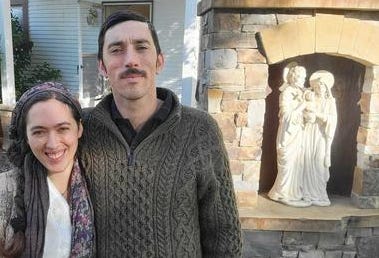I was twenty-seven years old when I partook of the vine for the first time —it was pear wine, and poured into two glasses, one for my fiance and one for me.
We were sitting on a rooftop garden in St. Louis. The man who would officiate our wedding had offered us the glasses, not knowing that my soon-to-be husband had given up drinking to court me and that I had been raised a teetotaler. Our friend said, "I made it myself from the tree growing in the backyard!"
Andy looked at me. I gently nodded. Together we raised our glasses, saying to each other, "Yes. This is right."
Already, for months I had been telling Andy, "Don't give up drinking for me. I don't believe men should give up anything for their wife unless it's truly immoral."
I often said, anyway, that I might start drinking if my husband did.
He asked, "Are you sure?" And thinking I wasn't certain, he refused to drink during the entirety of our early courtship.
Until now.
Everything about this moment was perfect down to the last drop of wine. We were offered refills. I, unaccustomed to drinking and not knowing how it might affect me, declined. My husband accepted, and I had one last sip from his glass. It was sweet and sour and joyful.
I knew now that we would be married, and that I had chosen the right man to spend the rest of my life with. There was no turning back now, in my mind —and there never would be any turning back. Already we'd discussed our thoughts on divorce, and how we would allow ourselves absolutely no allowance for divorce. There would be no contingencies, only unconditional love from here on out.
That first sip of pear wine symbolized something to me . . . something deeper than my rejection of "sola scriptura tradition" based on nothing other than "Feminist Teetotalism". For me, this was when I knew that I was marrying a man for all he was and all he might be. I would be leaving behind my girlhood to become a wife —a help-meet, a steady and loyal friend. I was marrying a man for all he would do, not for what I wished him to do.
For better or worse, for richer or poorer. It did not matter how he might change or what previous fantasies I'd had about marriage. All my dreams were laid to rest. I was marrying this man for his vision, not for what he might or might not do for me.
I used to idolize my aunts when I was a girl. I had five of them on my father's side. All of them were bold and beautiful, loud and outspoken, well dressed and well known. Every man loved them and they knew they could do and get anything they wanted —at least, that was how I perceived it.
However, despite countless suitors, they had a difficult time finding spouses.
I remember watching them break up with boyfriends or fiances who loved them very much. I witnessed countless heartbreaks, and all of them over minor religious differences. My aunts had a certain ego encouraged by my grandfather. Technically they believed the man should be the spiritual leader of the home. However, first they had to groom the potential husband to have all the right beliefs, so that way they could follow him in the correct way. My aunts believed themselves to be scholars of the Bible, and my grandfather thought any man who didn't hold all the many niche beliefs of our family was not going to be a good spiritual leader.
Naturally a few men wizened up. They said all the right things. They opened their Bibles where my aunts hoped they might, and interpreted things just as my grandfather wished them to. They passed the interrogations — they proved themselves worthy of being the leader of their own homes by submitting to the demands of my aunts and grandfather.
Weddings followed —and I was the happiest flower girl there ever could be.
They continued to pay lip service to "our husband is the spiritual head of our home." However, the moment my uncles tried to start leading their families, my aunts rebelled and bolted. How could their husbands know better than them? After all, wasn't it they who had taught their husbands to think as Believer thinks? How dare their men try to know better than they did now! Yes, the man was supposed to be the spiritual leader, but once he was no longer living by the right spirit and leading by false pretensions —well, there was no way God could want them to be subjected to that, now, was there.
Divorces followed — how could my aunts stay with men who'd changed their beliefs? It was abusive, they claimed. Destabilizing, dishonest, and disingenuous.
When they'd vowed for "better or worse" they had said those words to men they trusted —they couldn't trust men who misread the word of God!
The divorces of my aunts devastated me as a girl.
As a child I didn't get what the big deal was. I knew my uncles, too, and loved them. Sure they had some funny beliefs, but they were kind, respectful, and smart. I didn't see how disagreements about a few Bible verses was permission to undo sacred vows. Their children were hurt as a result. And God was not honored in this Loud Show of Self-Righteousness.
I decided then and there that I would never look to see if a man believed just like me, but whether or not I could respect him regardless of the changes that might come to his character and beliefs. I laid aside my Bible and my thoughts of it, and looked for a man who displayed the works of faith and the fruits of the spirit. I would offer him no tests, no interrogations. If I could not accept him as he was and as he might be, I wasn't interested. I created no "lists" for what might make me a good husband —only God could know that! I wished for only three things: that he displayed love for God (wasn't going to label it), that he was interesting, and that he was also kind. When I was a teenager, after reading a bunch of religious intellectual work, I joked, "I'll probably marry an orthodox Jew or a Catholic."
I never suspected that I might indeed fall for a Catholic man.
If I was raised to believe in anything, it was to be as anti-catholic as possible. Hadn't it been they who kept Christianity illiterate for a thousand years? Hadn't they killed anyone who disagreed with their interpretation and version of the Bible? It was Catholics who didn't want King Henry the VIII freed from the pope... they didn't think he should be allowed to divorce . . .
I didn't question my anti-catholic misconceptions. I simply fell in love with the voice of a man —a voice that led me to trust the speaker over the span of two hours. Before I'd answered my phone, I'd thought, "Why did I agree to this? I have too much going on." By the end of the call there was a war inside of me —was I really to give up all my dreams and ambitions for this man? I wasn't, but I knew I would. I wept thinking of the life I'd made for myself that could be no more. The world would tell a woman like me —twenty-seven years old and successful at business and solo traveling —to sacrifice nothing for a man, to keep their possessions, their identity, their politics, their faith, and their dreams intact. But God created me to be a help-meet, and I found the man whom my soul knew to be more familiar than any other.
We courted for a few months.
Immediately he offered to move for me, to stop drinking, to get a "real" job, to provide a regular home, to do anything I wanted. I said no to all of it. I wanted him to know who I had been thoroughly, yes, but it was I who would follow him. It was I who would move, give up my job, and change my faith, just as Ruth had done for Naomi and Sarah had done for Abraham, and Rebekah for Isaac. I would give it all up —but first I had to accomplish all my obligations. I taught the Living Room Academy for a summer, an immersive two-week program designed to equip and empower women to be spontaneously hospitable and capable of the feminine arts. I closed my cleaning business of ten years, caught up with my sewing at the formal wear store, packed my house, and made myself a wedding dress. As Jephthah's daughter, I hosted one last party with my friends and then moved across the states to live with my husband's grandmother as I prepared for our wedding.
I had doubts —how would we raise our children? What church would we attend? Could I ever "pray to Mary"? I also had faith. God had brought me this far —He would give me the wisdom to continue on.
We prayed and read a lot together, and talked through all our concerns and doubts, occasionally heated, but never with the thought that an unresolved debate could lead to either of us severing our engagement. We were simply right for each other, and we knew God would iron out the rest of the details in our hearts.

Near the end of our engagement we met a couple with two, happy teenagers. The teenagers were well-read, responsible, and respectable. They didn't seem ridden with angst. They were joyful home-schoolers with ambitions.
However, their parents were not of the same faith —they didn't even believe in the same God.
The father was Orthodox christian, and the mother was an Indian Sikh. Because her children appeared to be happy, and she herself, was sweet and selfless-centered, and her husband seemed confident of her love and support, I knew I could ask her for advice on how faith — and the differences of it — had impacted their family's well-being.
She was a loyal woman — a woman who'd had her husband's back through all sorts of trials. When they'd married they'd both been liberal and woke. Her husband changed first. Initially he was anti-God and joined a Wicca group. I asked her if it was hard when her husband chose to embrace such a sinister path. She said, “Not really. We were very communicative through it all and I knew that God was speaking to him in a way I couldn't understand. The only thing I could do was love him through his valley of darkness.”
In the midst of worshiping Satan he heard God speak to him, and found the Orthodox church. Although he lost credibility in the world's eyes, his family stuck by him all the more. She remained Sikh, but they attended church with the father, and at that point, the oldest daughter, too, had a religious experience in the church.
I was inspired.
Nearly all my extended relatives — grandparents, aunts and uncles, cousins — did support our marriage because I refused to "groom". Many argued that my family was right to boycott my wedding — that it was a spiritually unequally yoked marriage between “strangers of strange religions”. Nevertheless, we are both Americans, and we both love God. One doesn’t magically become “equally yoked” — and if being equally yoked means thinking and believing the same in all things, I wonder how it is that anyone ever manages to marry at all. Is that not the point of marriage? To learn how to be yoked together as one flesh as the years go on? Does a pair of oxen immediately know how to wear their yoke with harmony — is there not experience, time, and patience required? Nobody is ever equally yoked from the very start.
The peace of living in God's will is greater, though, than the acceptance of family or friends. The "trade" was worth it. And for the first time in my life I was receiving answers for doubts I'd had for years. I found mysticism and beauty and the grace of God —it was all more real than it had ever been before. Moreover, I found that in giving up my girlhood and the world's idea of identity, I was at last truly content with myself.
After that I met many couples in similar phases as us. One couple —where the man was Messianic and the wife was Catholic — had been married just as long as us, and were at the same place as us, religiously, seeing the need for a Torah vein within the Catholic church while simultaneously deciding to raise our children Catholic. We'd all come to this without knowing each other —it was completely born of the holy spirit.
I met a Latter Day Saint couple who had been married for thirty years in the church. They had four children, and they all were devout. But the wife began to doubt her faith, and then left it altogether. After months of theological distress, she said to her husband, “Do you want a divorce? I know I’ve changed — you don’t have to stay with me.” He told her he’d married her for better or worse, for richer or poorer. He wasn’t going to tear up their family because of her crisis of faith. He was going to stick by her side. Their marriage changed in nature, but their love only grew stronger.
The father was becoming Catholic in another family I knew, after a decade of marriage in a non-denominational church. He had children, and his wife was raised, like me, to believe the Catholic church is possibly the whore of Babylon. She was being encouraged to "leave" her husband because of his apostasy. Nevertheless, she confessed that she didn't understand how divorce could be biblical in this instance —for was a wife not to stay with a husband even though he was an unbeliever that she might save him through her example? And, she admitted, he was certainly not an unbeliever. He'd just come to see that the Catholic church was the true early church with unbroken lineage.
I heard countless other stories of couples choosing to stay true to their vows even when one of the spouses changed —spiritually, politically, or emotionally. There were those who stayed even when their spouse started voting democratically after holding a Republican card for thirty years, and vice versa. One of Andy’s grandmothers has chosen to stay with her husband even after it was discovered he had been molesting the grandchildren — she would visit him in prison, and write letters. She never approved of the crime, but said, "His wrong-doing against humanity will never justify me breaking my vows to him. I am still his wife." I met several other families where the parents were going through counseling, instead of divorce, when one of the spouses had committed adultery. Their church would have granted them a divorce, however, they knew that reconciliation was of the utmost good — and their children were inspired by the parents’ example to forgive and forget.
Meanwhile, I also saw those who justified divorce because "the other person had changed". Life was no longer fun, or it was now emotionally abusive, or there were suspicions of adultery. They pulled scripture to prove themselves vindicated. They posted selfies of themselves clad in indecent clothes and caked in too much makeup, claiming, "I am free! I look younger now! God did not want me to be unhappily married!" Did God truly expect you to stay married to someone who suddenly wanted to vaccinate your children when you initially agreed on medical freedom? Who decided that he no longer believed in God at all? Who never said a kind word to you? Who denied you the marital debt? Did God really expect you to turn the other cheek to your spouse? Surely, not!
In all these latter cases, the individual is suddenly more alive —and their will is what is amplified. The children are not healthier or happier for it —they see no true example of a god-fearing parent. The nature of the disagreement, or who's right and who's wrong is lost upon the children,and even upon the one separating themselves from the "betrayer". Every party becomes nasty, vindictive, and self-righteous.
Perhaps there is a time for divorce. But as Christians, it is not our duty to grope for nuanced truths. We are called to abide steadfastly to tried and true generalities. We are made to be bearers of Truth, and Truth does not change according to whims, experience, or feelings. It is the Pharisees who search for loopholes, not the humble, self-sacrificial servant of God. When we defend Divorce at all for any reason, we become like Leftists who claim that .008% of necessary abortions make it so you can't judge any abortion, and that in fact all abortions might be necessary by default.
Is there ever a time that is necessary to do evil? This is not the point. The point is — are you looking to follow God, or the independent self? The most radical thing you can do is focus on what is generally true, and to abide, heart and soul, within that mindset.
It is easy to extrapolate: “Well what if my husband does —. Wouldn’t that give me permission to leave him?”
The devil uses these hypothetical word games to influence the Christian that there are contingencies to why you don’t have to actually always do what’s best or good or wholesome. He’ll whisper, “Sometimes it’s impossible. Sometimes you just have to do what’s best for you.” He doesn’t want you to have strong and steadfast values. He wants your faith to waver.
My husband and I are currently traveling as nomads and living out of our backpacks —I never imagined the first year of my marriage like this. I had been brainwashed to think that marrying meant one thing: a man with a career paying for the mortgage of a home I'm sewing curtains for. We are enjoying our unconventional first year of marriage. It is partially unplanned (at least on my part). I never know where he and I will be from month to month. We are living indefinitely from the things we carry on our back as he writes. I follow, I attend church with him in whatever town we happen to be traveling through, and I am his friend while we traverse the world as pilgrims living out Matthew 5 and 6 as best as we can.
"It's easy for you," a friend recently said. "Because you like it and it makes you happy. But I could never do it."
This would be like a pampered woman telling a pioneer woman sitting on a rickety wagon with her grandmother's china clattering and cracking in the back as her husband drives the family further west that "it's easy for you, Betsy!" just because she's singing songs and wearing a wide smile.
Being a help-meet to your husband is not easy.
I prefer a well-stocked pantry, my dusty library, and my sewing room to whatever it is I manage to fit into my backpack. Sometimes my husband and I argue about the age of the earth or illegal immigration. Sometimes I nitpick over his appearance. Sometimes I think like a Protestant and he thinks like a Catholic, and when we do, we butt heads.
I love being married, however to call it easy just because I love my husband dismisses the actual effort we put forth in order to understand and respect each other. Nothing worthwhile is really very easy, not for anyone.
However, if you submit yourself to God's will, open your heart and allow yourself to be flexible, pliable, and spontaneous, giving up all control and allowing your husband to hold the reins, you'll find yourself at peace. There will be fears that'll wash over you. There will be pain and hardship and uncertainty. You will find pieces of yourself dying as you become less yourself and more God's. There are things you will find yourself doing that you might have thought you'd never do, and you will be happy, and they will appear easy in the eyes of friends and strangers, because submission is accompanied by few complaints and much rejoicing.
Marriage is so much more than merely marrying a man —it's marrying a man with a calling from God, a calling that is only possible with the perseverance of two united souls. Anything that might deter one's husband from his calling must be discarded: all thoughts of comfort, of needs, of desires, of pleasures. It is only when we are in complete submission to the whims of the wind —to the Holy Spirit and our husbands — that we find ourselves doing seemingly impossible tasks with gleeful abandon.
I would like to think that I have unlocked the secret to unhappiness by doing what my aunts did not do. As every wise, old woman reminds me — life is long, and time will reveal truth eventually.
If you enjoy my writing, and would like to support my endeavors, you can send a donation by clicking on this button. Coffee over-hypes me, so I’ll probably use it for books or spices or yarn!
Four Churches
We’d just finished watching the movie Jesus Freaks when Andy asked me to marry him. It was early September… he’d planned to wait until I’d met his family in November, but we were ready to start planning our future. By all legalist appearances, we might seem unequally yoked. I was raised in a niche of an already obscure messianic movement, and he, born i…








I think people get divorces too easily. I also think that the habit of sleeping around leads to conflict turning into affairs before it gets resolved.
Now, if the spouse is abusing the children, especially in a sexual manner, I think the innocent spouse has a duty to save the children from harm, which means getting them away from the abuser. (In my case, I am pretty sure if my theoretical husband abused my kids, my brothers or dad would make me a widow before divorce was necessary.)
These wise words hit some tender spots in my own life in just the right way. Especially loved your musings on simply finding a good man, with fruit to show. They are out there and it's such a gift to marry them.